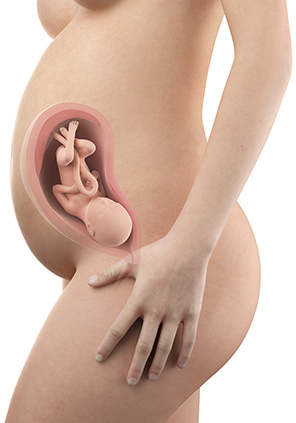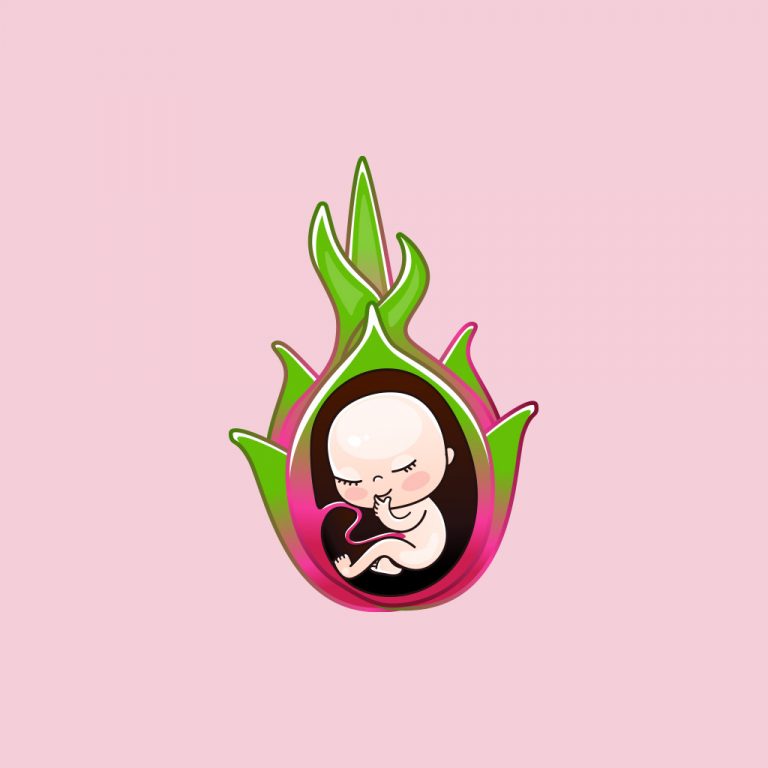Congratulations, you’ve reached Week 27! This is a special milestone, as it’s the final week of your second trimester. Your baby and your body are both making important shifts to get ready for the exciting months ahead. Let’s look at what’s happening this week and what you might experience as you get closer to meeting your little one.
At 27 weeks, your baby is close to two pounds and about the size of a head of cauliflower. Inside your belly, your baby can now open and close their eyes, respond to sounds, and may even get the hiccups from time to time. You might start feeling more of those gentle—and sometimes surprising—kicks and rolls. These movements are not only heartwarming, but they’re also a wonderful sign that your baby is growing stronger every day.

Your own body is remarkable, too! You may notice your belly growing more this week, and your balance might start to feel different as your center of gravity changes. It’s normal to feel a little more tired, so listen closely to what your body needs. If you’re having trouble sleeping, try settling into a comfy side-sleeping position with a pillow between your legs for extra support.
As you move into the third trimester, you might notice a few new symptoms. Some women experience leg cramps, swollen feet, or mild shortness of breath. These changes can be uncomfortable, but most are completely normal. Gentle stretching, staying hydrated, and taking breaks with your feet up can make a big difference.
- If you haven’t already, this is a great time to start thinking about birth plans and prenatal classes, if you’re interested.
- It’s helpful to keep track of your baby’s movements, especially as they begin to develop a more regular pattern.
- Don’t forget to enjoy some quiet moments—read a favorite book, listen to music, or simply rest and daydream about meeting your baby soon.
Every pregnancy is unique, so remember to trust your instincts and reach out to your healthcare provider with any concerns. You’re doing wonderfully, and each week brings you closer to holding your baby in your arms. Hang in there, and take care of yourself as you enter this beautiful new chapter!
Your Baby’s Development This Week
As you begin week 27, your baby is making incredible progress and preparing for the exciting day when you’ll finally meet. At this stage, your little one is about the size of a head of cauliflower and is busy developing important skills that they’ll need after birth.
Getting Bigger and Stronger
Your baby now measures roughly 14½ inches from head to heel and weighs close to 2 pounds. It’s amazing to think this is about double what they weighed just a month ago! Their body is steadily filling out, with more fat forming under their skin, which will help keep them warm after birth. Right now, their skin still looks a bit wrinkled, but it’s becoming smoother and more baby-like every day.
Awakening the Senses
This is an exciting time for your baby’s senses. They’re starting to recognize your voice—and maybe even your partner’s—growing more comfortable with the familiar sounds surrounding them. You might notice that your baby sometimes becomes more active when you’re talking, singing, or reading aloud. These little moments help build a special bond even before birth.
- Eyes: Your baby’s eyelids, which have been closed for a while to protect their developing eyes, are beginning to open again. While their vision is still limited, your baby can sense changes in light—try gently shining a soft light over your belly and you might feel some gentle kicks in response!
- Touch and Movement: Your little one loves to move, stretch, kick, and even practice holding onto things with their tiny hands. You may feel more noticeable rolls, wiggles, and even some rhythmic movements that could be hiccups as your baby’s diaphragm continues to develop.
Breathing and Brain Boost
Even though their lungs aren’t quite ready for the outside world, your baby is practicing “breathing” motions now—drawing amniotic fluid in and out of their lungs. This practice is vital for when they take their first real breaths after birth! Meanwhile, your baby’s brain is growing quickly and becoming more active. Brain tissue is developing at a rapid pace, laying the foundation for all the learning and discovery your little one will do after they arrive.
Daily Rhythms
You may notice your baby following certain patterns throughout the day, with times of more activity (often as you’re winding down in the evening) and quieter periods when they’re sleeping. Each baby is unique—some are little night owls, while others like to kick up a storm in the middle of the day. Try relaxing and paying attention to your baby’s patterns; it’s a wonderful way to connect!
Ready for the Future
Most babies at 27 weeks still love their cozy, curled “fetal position,” but inside, they’re preparing their muscles and senses for the outside world. It won’t be long before you welcome your precious baby into your arms. You’re doing an amazing job nurturing and supporting their development every step of the way!
Changes in the Mother’s Body
As you reach 27 weeks, you’ll likely notice your pregnancy is making itself known in brand new ways. Your body is working hard to create the perfect home for your baby’s last phase of growth before birth. It’s normal to feel both excitement and a few aches and pains as this next chapter begins.
One of the first changes you might see is your belly becoming more pronounced. The growth can feel dramatic now, and you may find that your belly button is beginning to flatten or pop out. Don’t worry — this is a harmless (and temporary) sign that your baby is gaining size and strength.
Many expectant mothers start to feel more tired than before. Carrying extra weight can make everyday tasks more exhausting. You may also find yourself short of breath during simple activities, like climbing stairs or going for a walk. This is mostly because your growing baby is pushing up against your lungs, making it a bit harder to take deep breaths.
Around this time, some women begin to notice changes in their skin. For example, you might see a dark line, known as the linea nigra, running down your belly. You could also notice that your skin feels itchier, especially as it stretches. Applying a gentle, fragrance-free moisturizer can help soothe itchiness and keep your skin comfortable.
Swelling (also called edema) is very common now, especially in your ankles, feet, and hands. This happens because your body is holding extra fluids to support your pregnancy. If your rings or shoes start to feel snug, it’s perfectly normal. Resting with your feet up and staying well-hydrated can help reduce swelling.
You might also be experiencing some new digestive issues. Heartburn can become more of a nuisance as your uterus presses against your stomach. Eating smaller meals and avoiding lying down right after eating can help. Constipation is another common symptom; drinking water and eating fiber-rich meals may ease this discomfort.
- Backaches and posture changes: As your baby grows, your center of gravity shifts. This may cause back pain or even some pelvic soreness. Try to stand tall, avoid standing in one spot for too long, and use supportive pillows when you rest.
- Breast changes: You may notice your breasts getting larger and more sensitive as they prepare for breastfeeding. Some women see small drops of a yellowish fluid — this is called colostrum, a nourishing first milk your baby will have after birth.
- Frequent urination: Your baby’s position can put more pressure on your bladder, making more bathroom trips necessary. If sneezing or laughing leads to a little leak, know that this is very common and nothing to be embarrassed about.
- Trouble sleeping: As your body changes, you may find it harder to sleep through the night. Try using a pillow between your knees when lying on your side, take relaxing baths before bed, or practice deep breathing to help you drift off.
Above all, remember that your body is doing something extraordinary. Every stretch mark and sore muscle is part of your journey to motherhood. Be patient with yourself, rest when you can, and know that your experiences are normal — even if they feel a bit overwhelming some days. If you ever have concerns or your symptoms change suddenly, always check in with your healthcare provider. You’re not alone, and support is always available as you move forward in your pregnancy.
What Medical Checkups Happen at 27 Weeks?
As you reach 27 weeks of pregnancy, your healthcare provider will want to make sure that both you and your baby are healthy and progressing as expected. This is an important milestone because you are just starting your third trimester, and regular monitoring helps catch any possible concerns early on.
Here’s what you can expect at your medical checkup around week 27:
- Measuring Your Belly: Your doctor or midwife will gently measure the size of your belly from your pubic bone up to the top of your uterus. This helps make sure your baby is growing well and on track for their age.
- Checking Your Weight and Blood Pressure: Keeping an eye on your weight and blood pressure helps spot any issues, like signs of preeclampsia (a high blood pressure condition that needs attention) or too much or too little weight gain.
- Urine Sample: You may be asked for a urine sample. This quick test checks for protein (which can be a warning sign for high blood pressure problems) and sugar levels, flagging signs of gestational diabetes early.
- Gestational Diabetes Screening: Most moms take what’s called a “glucose screening” around this stage—sometimes between 24 and 28 weeks. You’ll drink a sweet liquid at the clinic, then have your blood drawn about an hour later. This test helps check how well your body is handling sugar and looks for gestational diabetes, a type of diabetes that develops during pregnancy. Catching it early means you and your baby can get the support you need if results come back high.
- Listening to Your Baby’s Heartbeat: Every appointment, hearing your baby’s heartbeat is a special moment. Your provider will use a small device to listen in, making sure your baby’s heart is strong and steady.
- Troubleshooting New Symptoms: If you have new symptoms—such as headaches, swelling, changes in vision, or pain—share these with your provider. Some changes are expected, but it’s always best to speak up so you get the care you need.
- Discussing Your Baby’s Movement: As your baby’s kicks and stretches become stronger, your provider may talk with you about counting these movements at home. Keeping track helps you notice patterns and can be another way to make sure your baby is thriving.
If you’re Rh-negative (meaning your blood type is Rh-negative), your provider may talk to you about getting a shot called Rh immunoglobulin around this time. This shot helps protect your baby from certain blood-type problems that can occur during pregnancy.
Finally, your pregnancy care team might begin to talk with you about what to expect in the coming months, such as signs of preterm labor, the importance of regular movement, and any questions you have about your birth plan. Every pregnancy is unique, so don’t hesitate to discuss any worries or changes you notice.
Regular checkups are a wonderful way to make sure you and your baby are both supported and healthy as you head into your third trimester. You’re doing great—keep asking questions and letting your care team guide you every step of the way.
Nutritional Tips and Physical Exercise
At 27 weeks, your body’s working hard to support your growing baby—think of it as a team effort between you and your little one! Now is an excellent time to refresh your eating habits and find gentle ways to keep moving, both of which can help you feel your best as you head into the final trimester.
- Add Color to Your Plate: Try to fill your meals with as many colorful fruits and vegetables as possible: orange carrots, leafy spinach, berries, peppers, and sweet potatoes all pack in important vitamins. A rainbow of produce means you’re getting a range of nutrients your body and baby need.
- Build Steady Energy: Whole grains like oatmeal, brown rice, and whole grain bread help keep your blood sugar stable and give you energy that lasts throughout the day. Swap out white rice or white bread whenever you can for whole grain versions.
- Powerful Protein Choices: Your baby’s muscles and organs grow rapidly at this stage, so aim to include protein at each meal. Great options are eggs, beans, lentils, lean meats, tofu, and yogurt. Sprinkle nuts or seeds onto your morning cereal for a quick protein boost.
- Focusing on Healthy Fats: Healthy fats, especially omega-3s (found in fish like salmon, chia seeds, and walnuts), are excellent for your baby’s developing brain. Incorporate a small portion with your meals when you can.
- Snack Smart: If you find yourself getting hungry between meals, reach for snacks like apple slices with peanut butter, a banana with a handful of almonds, or a small bowl of low-fat cottage cheese with fruit. These help you feel full and give your baby steady nutrition.
- Don’t Forget Fluids: Carry a water bottle with you and take little sips throughout the day. Hydration helps keep swelling in check, eases constipation, and supports your growing blood volume.
- Getting Active Safely: Even simple activities, like a daily walk around your neighborhood or gentle prenatal yoga, can keep your energy up and help your body adjust to pregnancy’s physical changes. Moving regularly can also make sleeping at night easier.
- Listen to Your Body: You might feel a bit heavier and notice some extra aches. That’s normal! Always move at your own pace and take breaks as needed. If you feel dizzy or uncomfortable, pause right away and rest.
- Stretching is Your Friend: Gentle stretching, especially for your back and legs, can ease muscle tightness. Try a few light stretches in the morning and before bed. A warm (not hot) bath is also soothing after a long day.
- Strengthen Your Core and Pelvic Floor: Simple pelvic floor exercises, sometimes called Kegels, support your growing belly and help prevent leaks when you sneeze or laugh. A strong core can make labor and recovery a bit easier, too—ask your doctor or midwife to show you some gentle exercises.
- Careful with Balance: As your belly grows, your balance may change. Choose exercise routines that don’t put you at risk for falling—walking, swimming, prenatal yoga, and stationary cycling are all safe picks for most moms-to-be.
Embracing good nutrition and gentle movement now is a wonderful gift to both you and your baby. If you have specific food cravings or questions about what’s safe, always check in with your provider—they’re here to support you every step of the way.
Weekly Checklist
This is a busy but exciting week as you step into your third trimester! Here are some helpful things to focus on at 27 weeks to support your wellbeing and prepare for the coming months:
- Start keeping a kick count journal: Pick a time each day to track your baby’s movements. Feeling regular kicks and wiggles helps you notice your baby’s unique patterns, and lets you spot any changes quickly. Ask your provider how many movements you should expect.
- Create a bedtime routine: If sleep is getting tricky, try winding down at the same time each night with calming activities—like a warm bath, gentle stretching, or reading. Think of sleep as self-care for both you and your baby!
- Plan nutritious, easy snacks: Stock up on cut-up veggies, nuts, yogurt, or fruit so you always have something nourishing handy—especially when hunger strikes between meals.
- Pay attention to swelling: Notice if your hands, face, or feet are puffier than usual. Some swelling is normal, but let your doctor know if it becomes sudden or severe.
- Support your back and hips: Try a belly support band or prenatal yoga stretches to relieve tension as your posture changes. Small, regular movement helps too—even a light walk around the house counts.
- Double-check your prenatal vitamins: Make sure you’re taking your daily vitamins and ask your provider if you need more iron or calcium. A gentle reminder—never start new supplements without checking in first!
- Start discussing leave plans with work: If you’re employed, now’s a good time to review your workplace’s maternity leave policies and talk to your manager, so you feel organized and supported when the big day arrives.
- Connect with Dad or support system: Share how you’re feeling, talk about your hopes (and worries), and let loved ones help with practical tasks—like grocery shopping or putting together baby furniture.
- Begin researching pediatricians or family doctors: Ask friends, family, or your healthcare provider for recommendations. Jot down questions for your first meetings so you feel confident about your choice when baby arrives.
- Take moments just for you: Whether it’s journaling, listening to music, or sitting quietly with a cup of tea, give yourself permission to pause and enjoy the connection with your growing baby.
Each little step keeps you healthy, prepared, and empowered as you enter the home stretch of your pregnancy. Remember, every question is important—don’t hesitate to reach out to your healthcare provider any time you need reassurance or support.
When to Call Your Provider
During week 27, both you and your baby are changing quickly. While most symptoms are completely normal, there are some signs that let you know it’s time to call your doctor or midwife for advice. Trust your instincts—if something feels off, it’s always okay to reach out for reassurance or guidance.
- Heavy Bleeding or Spotting: Light spotting can sometimes happen after sex or an exam, but if you notice anything more than a few drops, or if the bleeding seems like a period, call your healthcare provider right away.
- Severe or Persistent Abdominal Pain: Mild aches are common as your baby grows, but sharp, severe, or constant pain in your belly is not. Don’t wait to get it checked out.
- Severe Headaches or Blurred Vision: If you develop a sudden, intense headache, vision changes, or feel very dizzy, call your provider. These can sometimes mean your blood pressure is too high.
- Sustained or Intense Contractions: Feeling your belly get hard every now and then is often normal. But if contractions happen more than four times in an hour, are becoming regular or painful, or don’t go away with rest and water, you could be in early labor and should call your healthcare team.
- Leaking Fluid: If you notice a sudden gush or a constant trickle of clear, pale fluid from your vagina, let your doctor know. This could signal that your water has broken early.
- Noticeable Decrease in Baby’s Movements: After 27 weeks, you’ll likely feel your baby move every day. If you notice a big drop in activity, or aren’t feeling your baby move at all, contact your provider, even if you aren’t sure.
- Swelling That’s Sudden or Severe: It’s normal for your feet and ankles to swell, but if you suddenly develop swelling in your face or hands, or you gain a lot of weight quickly, call your provider—it could mean your body needs some extra attention.
- Burning with Urination or Fever: Pain when peeing, a fever, or chills are signs of infection, which can sometimes lead to complications if not treated right away.
- Shortness of Breath or Chest Pain: Feeling a little short of breath can be normal, but if you can’t catch your breath even when resting, or you have chest pain, seek help promptly.
- Severe Nausea or Vomiting: If you can’t keep any food or fluids down for a whole day, or if you feel very weak or dizzy, give your provider a call. Dehydration isn’t good for you or your baby.
Remember, you are never bothering your doctor by asking questions or talking about your worries, no matter how small they seem. Your well-being matters—and getting in touch at the first sign of any problem is always the smart and safe thing to do for you and your growing baby.
Preparations for Baby
This is such a meaningful time as you get ready to welcome your little one! Preparing both your heart and your home can help reduce stress and make this final stretch feel more joyful and intentional.
- Create a calm, inviting space: Even if you don’t have a full nursery, choose a cozy spot for baby essentials like a bassinet or crib, changing area, and feeding chair. Add a soft blanket or family photo—anything that makes you smile and feel at peace.
- Practice newborn care basics: If you haven’t already, try dressing a tiny outfit on a stuffed animal or doll. It’s a sweet way to build confidence for diaper changes and gentle handling, especially if you’re new to this.
- Wash clothes and linens: Put together a few clean onesies, swaddle blankets, and crib sheets using mild, fragrance-free detergent. It’s comforting to know everything that touches your baby is soft and gentle.
- Stock up on daily basics: Prepare a small stash of diapers, wipes, and a safe, simple baby soap. Think about organizing these where you’ll easily reach them day or night, saving yourself extra effort later.
- Set up a “mommy care” basket: Fill a basket with water bottles, snacks, lip balm, nursing pads, a book, or anything that soothes you. Place it by your bed or feeding chair for those early days when you’ll want things within arm’s reach.
- Connect with your support circle: Take a moment to share your thoughts or worries with a close friend, partner, or fellow mom. Letting your loved ones know how they can help—whether with meals, errands, or simply encouragement—will be a blessing after your baby arrives.
- Take some “you time”: Treat yourself to a favorite activity, quiet afternoon, or even just a slow walk. Nurturing your own well-being now is a meaningful way to care for your growing family.
Every little step adds up, and your love is truly the best thing you can prepare. Trust that you are doing wonderfully and know you are not alone on this journey.
Citations and References
- American College of Obstetricians and Gynecologists (ACOG) – Provides guidance on fetal development, prenatal visits, and physical changes in the third trimester. Visit Source
- Centers for Disease Control and Prevention (CDC) – Offers information on prenatal care best practices and healthy pregnancy habits. Visit Source
- World Health Organization (WHO) – Details maternal nutrition, antenatal care, and fetal growth recommendations. Visit Source
- Mayo Clinic – Weekly breakdown of fetal development and what to expect at 27 weeks pregnant. Visit Source
- Cleveland Clinic – Insights on common maternal symptoms, changes in the third trimester, and self-care strategies. Visit Source
- National Institutes of Health (NIH) – Covers fetal neurological development and maternal health monitoring at this stage. Visit Source
- March of Dimes – Offers information on fetal growth milestones, movement, and preparation for birth during week 27. Visit Source










